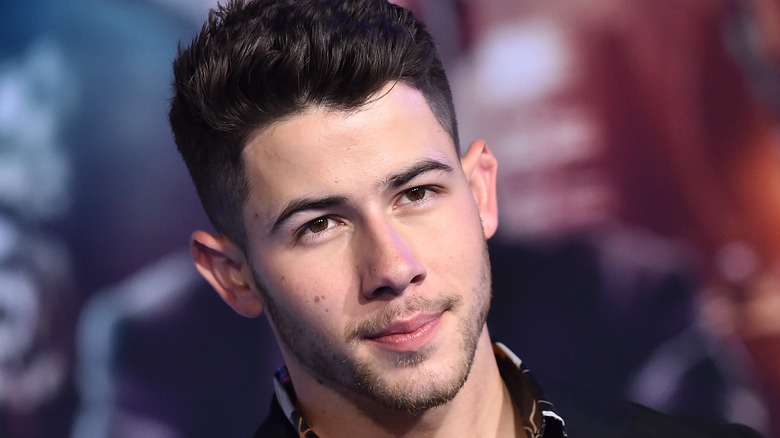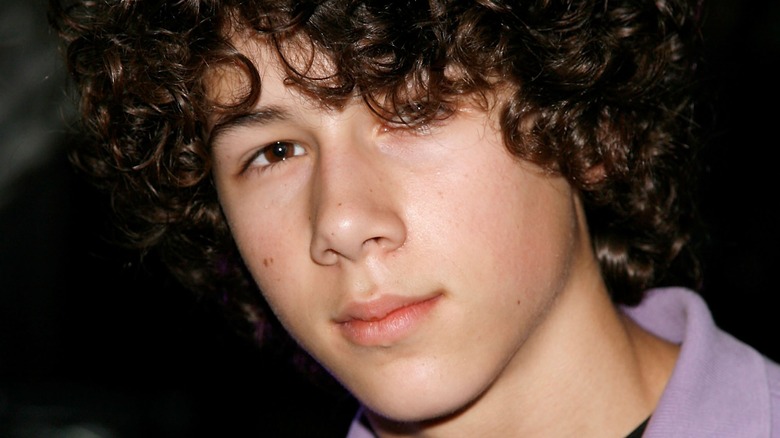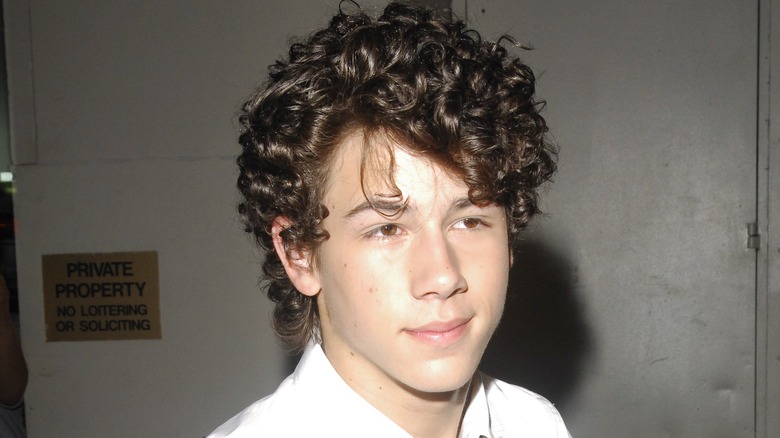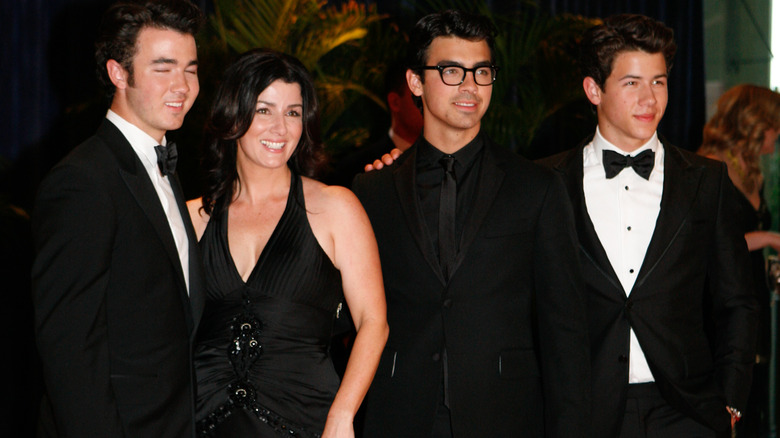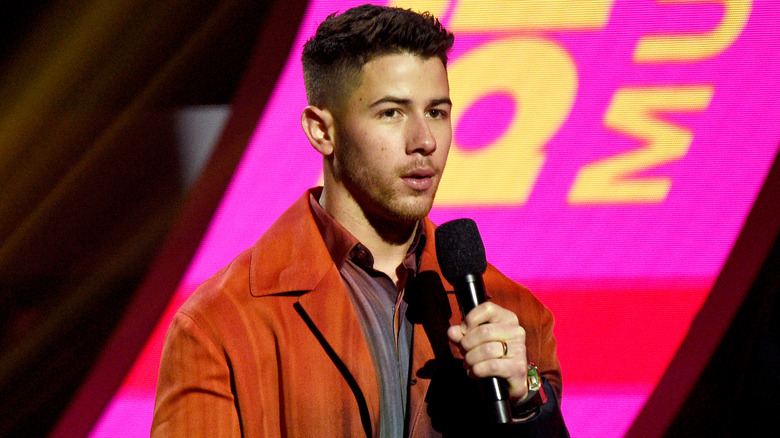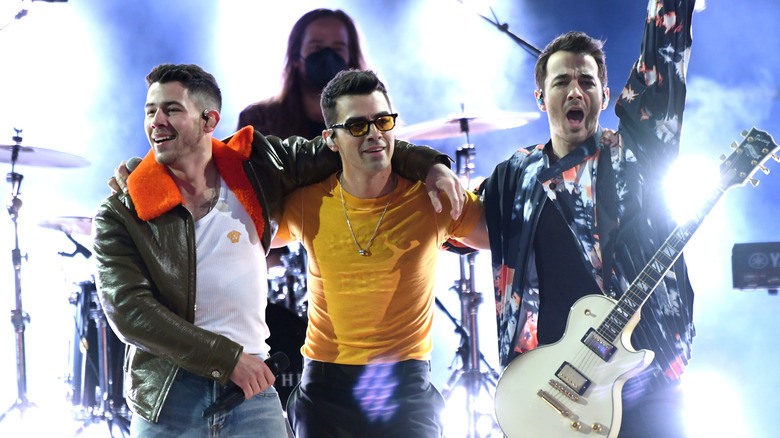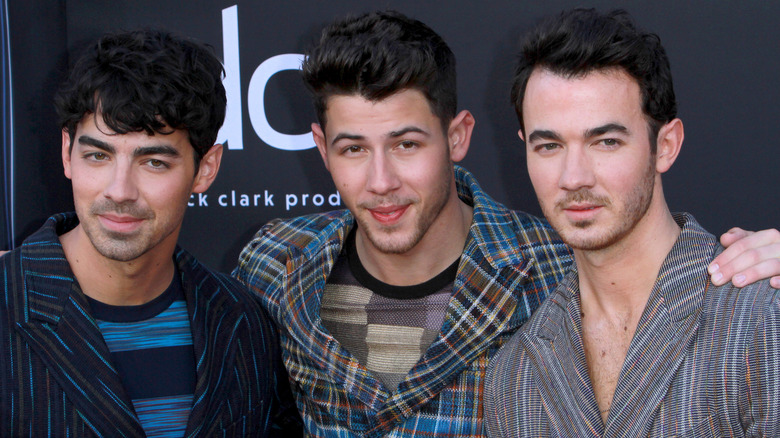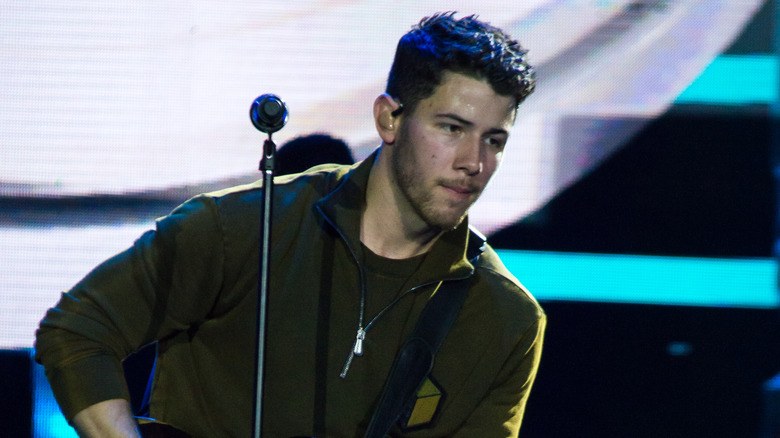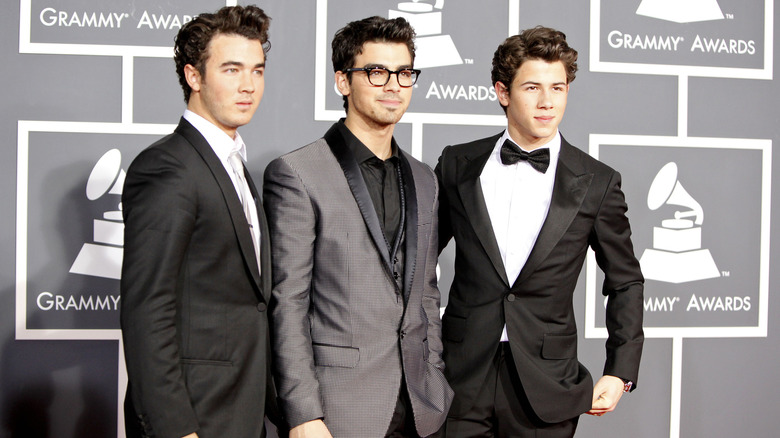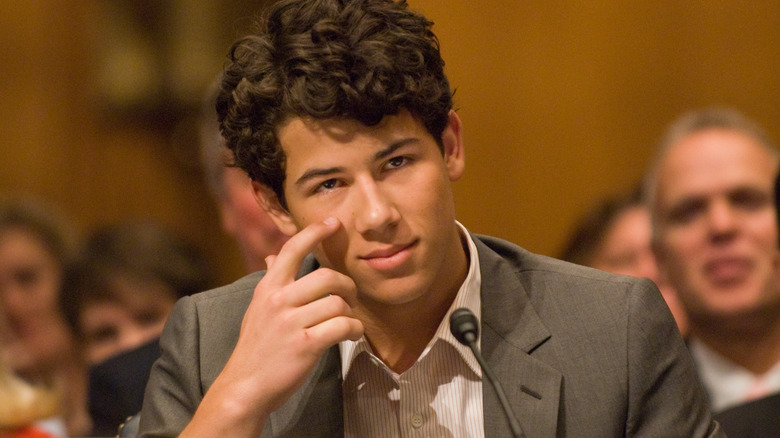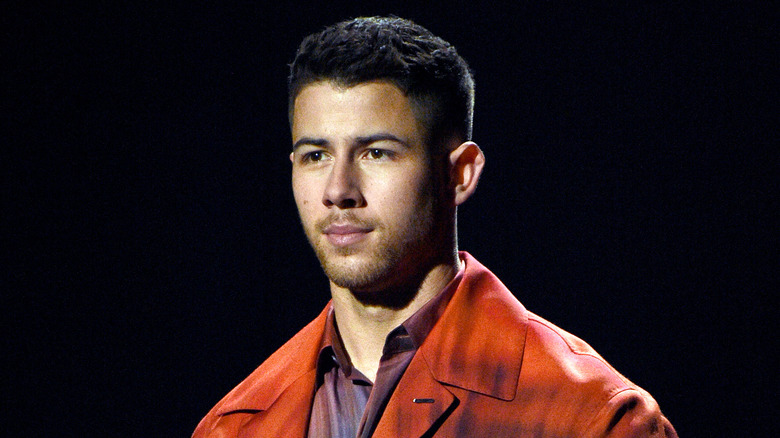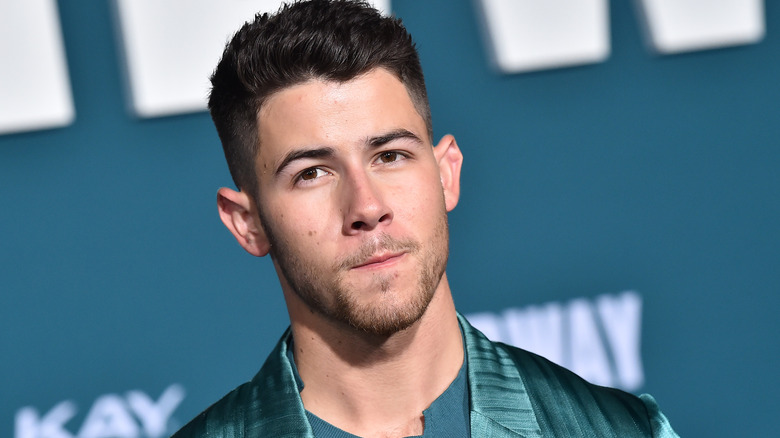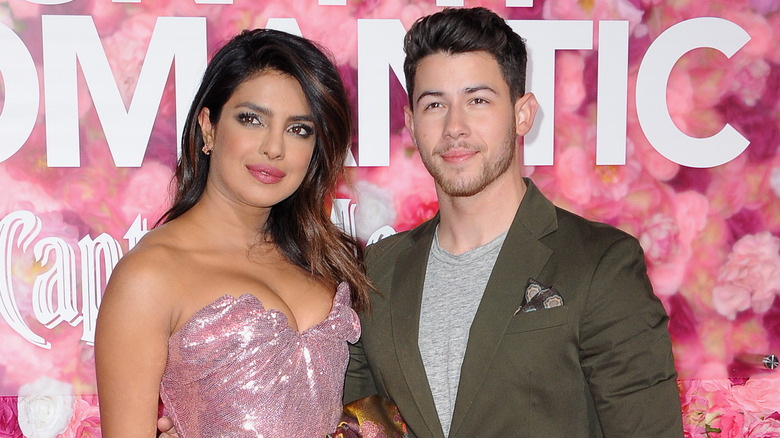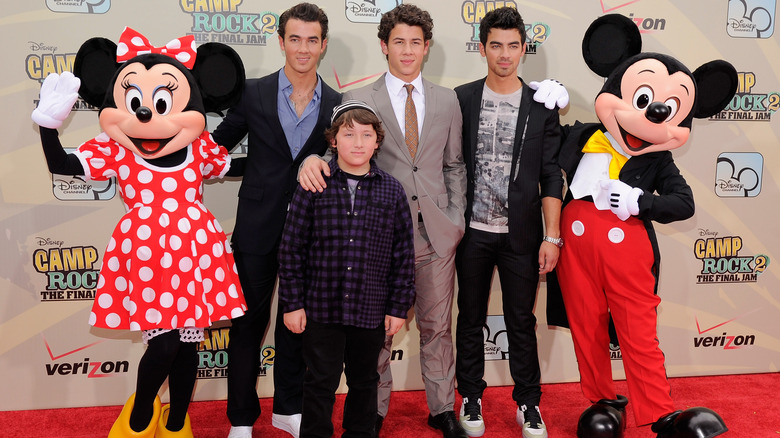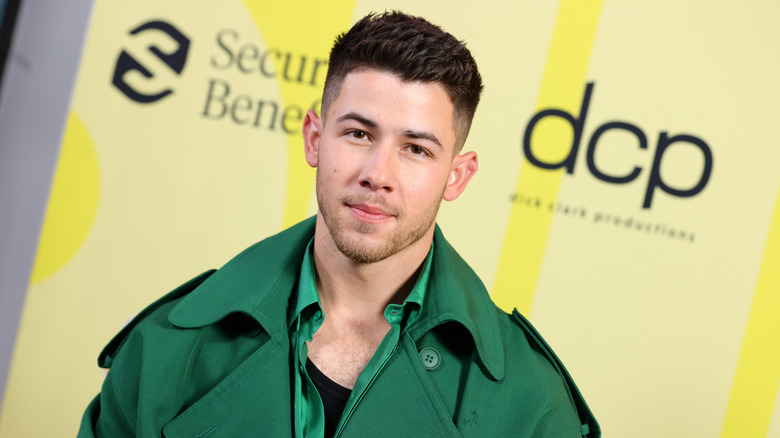Nick Jonas' History With Diabetes Explained
If you're not Nick Jonas, take a moment to imagine being 13 years old and living the popstar life. Travel, screaming fans, bright lights, and fame all being more commonplace for you than school dances and afterschool clubs. But something seems wrong. You're incredibly thirsty and become moody for no apparent reason. Then, one day, you're being rushed to the hospital because of a serious condition you didn't even know you had. This is what singer and guitarist Nick Jonas faced when he learned he had type 1 diabetes (via Verywell Health).
While diabetes has become treatable — a person with the disease can lead a very full life — this was not always the case. According to Healthline, if you were diagnosed with type 1 diabetes a hundred years ago, your life was considered over. And that is not meant metaphorically. Had Jonas been born a century earlier, he would have probably been told that he wouldn't live to see adulthood. But even with modern medicine and understanding of this disease, he still faced real danger that day in the ambulance.
As Verywell Health detailed, when Jonas was being rushed to the hospital, he was experiencing diabetic hyperosmolar syndrome. This sometimes fatal condition occurs when someone's blood sugar is more than 600 mg/dL (milligrams per deciliter). Jonas' sugar levels were above 700. This eye-opening scare, however, put the youngest Jonas Brother on a path filled with challenges but also opportunities to inspire others.
As his career takes off, diabetes strikes
It's hard to imagine now, but the start of Nick Jonas' career and the birth of the Jonas Brothers group began in a hair salon (via New York Magazine). As his mother, Denise, was getting her hair done, 6-year-old Jonas took the opportunity to sing. Just like a scene from a movie, someone in his "audience" gave him a recommendation that changed his life: Get a manager.
Before long, Jonas had roles in "The Christmas Carol," "The Sound of Music," and "Les Misérables," and no, not school productions of the famed shows, according to New York magazine. In fact, the youngest Jonas brother was mainly homeschooled, so the theatre community became a major part of his social life. Unfortunately, at age 11 he grew too tall to be a theater kid any longer and left. As luck would have it, he was signed by a recording executive, and although he was a solo act to start, his older brothers, Joe and Kevin, soon joined him in the spotlight.
As the Jonas Brothers began their lives on the road as a band, Joe and Kevin noticed that their little brother constantly craved soda (via People). What they didn't realize is thirst can be a sign of diabetes. Even when Jonas lost a great deal of weight very quickly, his family was surprised and even concerned but unaware that they were witnessing the effects of unchecked diabetes on his body.
The news sinks in
Besides physical changes, diabetes was affecting Nick Jonas on an emotional level (via ABC News). Kevin and Joe watched as their younger brother became moody and cranky. Granted, such behavior is not uncommon for teenagers, but in this case, it was another sign of diabetes: irritability. And Jonas would learn about this aspect of his condition and a great deal more once he was hospitalized.
As ABC News explained, type 1 diabetes occurs when your body mistakes the cells that produce insulin for something dangerous. Just as your immune system would attack a virus, it targets these cells, leaving you unable to make insulin, which is crucial for processing carbohydrates. Without insulin injections, your body's sugar can rise to dangerous levels, which is what happened to Jonas. (With type 2 diabetes, the body still produces insulin, but not enough. Type 2 diabetes can eventually go away completely with diet, exercise and weight loss, but type 1 diabetes does not currently have a cure.)
"The first thing I asked was 'Am I going to die?'" Jonas recalled (via ABC News). "My doctor said no, but that this is something you'll have to live with for the rest of your life." Initially, Jonas struggled to find a bright side to his diagnosis. But it was his family and career that helped him accept but not surrender to his new reality. "I knew we [the Jonas Brothers] were on a journey to places I couldn't even begin to imagine," he said. "And I thought enough's enough. Enough feeling sorry for yourself, and I made a commitment to myself that I wouldn't let [diabetes] slow me down."
Nick Jonas' family rallies around him
Just as Nick Jonas was determined to control his type 1 diabetes rather than let it control him, his family stepped up to make sure he wasn't dealing with his ailment alone. His mother, Denise, told CNN that she didn't know anything about diabetes before her son was diagnosed. But she still suspected something was wrong, especially when he vomited in a hotel lobby after drinking eight glasses of chocolate milk (via American Diabetes Association).
His sudden weight loss also concerned her. "I said to my husband, 'He looks like a prisoner of war — he has no muscle tone –– everything's gone,'" she recalled (via American Diabetes Association). Once she was told that her son has type 1 diabetes, Denise along with the rest of the family committed themselves to learning how they could help Jonas. "How to monitor him, how to administer his insulin shots, how to test his blood, how to give him a glucose shot if for some reason he passed out and went into a diabetic coma," she told CNN, adding, "It's a lot of work."
With his family's support, Jonas and his brothers resumed their popstar lives, which was terrifying for Denise (via American Diabetes Association). Fortunately, her 13-year-old son took his condition seriously and made sure to monitor his blood sugar and get his insulin shots even as the Jonas Brothers traveled from gig to gig.
Nick Jonas goes public with his diagnosis
Although Nick Jonas immediately made lifestyle changes to manage his diabetes, it would be two years before he went public about his condition. In 2007, the Jonas Brothers performed at an event hosted by the Diabetes Research Institute Foundation (DRIF) called Carnival for a Cure.
Jonas asked everyone watching their show at the Carnival to raise their hands if they have diabetes (via PRNewswire). "I raised mine, too, telling the world for the first time that I had the disease," Jonas recalled at the 2011 Carnival for a Cure. Carolyn Goldfarb, who helped chair the Carnival, remembered that "Nick silenced the crowd when he divulged for the first time that he has type 1 diabetes" (via (DRIF).
Although the number of children in the U.S. diagnosed yearly with type 1 diabetes is in the tens of thousands, teenagers with this condition can feel like it puts a spotlight on them in a bad way. As Jonas' doctor, Francine Kaufman, told CNN, "The real driving force for a teen is to be just like every other teen, so having anything different — and particularly a chronic illness — sets you apart and many, many of these teenagers feel it." By going public Jonas, "sensitized millions of teens and parents to the disease and the need to find a cure," Goldfarb said (via DRIF).
Nick Jonas is not alone as a celeb with type 1 diabetes. Other celebs with type 1 diabetes include Tom Hanks and Halle Berry.
Nick Jonas' experience touches others
Nick Jonas going public about having diabetes didn't only help remove the stigma some teenagers feel about the disease, but it also helped save the life of a 12-year-old girl. Lesia Daniel wrote to Diabetes Health Magazine about how her daughter Morgan was getting ready to go to a Jonas Brothers' concert when she noticed her new jeans were really big on her. At the time, Lesia didn't realize that Morgan's sudden weight loss and thirstiness were symptoms of diabetes, even though Lesia herself needed an insulin pump. All that changed, however, when Morgan told Lesia that Jonas had type 1 diabetes.
"The next morning, we talked about how much fun we had at the concert and again spoke of Nick being diabetic," Lesia wrote in her letter to the magazine. "All of a sudden, a light bulb went off in my head. I thought, 'Oh, my, Morgan has all the symptoms of diabetes!'" Sure enough, when Lesia tested her daughter's blood sugar, it was 356, and by the time she got home from school, it was above 500.
As upsetting as the news was, Lesia is grateful to Jonas (via Diabetes Health Magazine). "If he hadn't spoken out about his diabetes I may have not thought about her symptoms until she had gotten really sick," Lesia wrote. "It's scary enough to be diagnosed at a young age, but when you know there are other kids going through the same thing as you, it helps."
Understanding Nick Jonas' symptoms and treatments
Roughly eight years after Nick Jonas told the world that he has diabetes, he helped found Beyond Type 1, a nonprofit that supports educating the public about type 1 and, more recently, type 2 diabetes (via Beyond Type 1). While Jonas didn't recognize his symptoms back at age 13, Beyond Type 1 spells out the four major warning signs of diabetes: "excessive thirst, frequent urination, unexplained weight loss, [and] exhaustion." However, these are not the only possible effects of being diabetic.
As Beyond Type 1's website explains, a person with type 1 diabetes may have stomach issues, including pain and nausea. They also may experience confusion, rapid breathing, and even have breath that smells like fruit. In addition, Colin A. McCannel, the medical director of the UCLA Stein Eye Center told Self that high blood sugar levels can lead to blurry vision. And as endocrinologist Sarah Rettinger told the publication, not managing your diabetes can make your hands and feet feel numb, as well as cause nerve damage and strokes.
Jonas continues to encourage others to take their diabetes seriously and used a before and after picture of himself on Instagram in 2015 to illustrate the importance of eating healthy, exercising, and managing blood sugar levels. He finished his post encouraging his social media follower: "Never let anything hold you back from living your best life."
He spreads awareness through his music
Just as Nick Jonas learned being open about having diabetes could help others, he also found a new level of support from his fanbase. "I've heard from a lot of fans over time that have actually encouraged me and lifted me up in moments when I was feeling down about it," Jonas told Entertainment Weekly. One such case happened on a golf course when Jonas helped a little boy who had lost his diabetes management supplies. "I offered to help, went and got him juice. He didn't even realize at first that it was me." Later, Jonas received a long letter from the boy's mother, thanking him for helping her son.
With such a positive response to going public, Jonas decided to write a song about living with diabetes. The song titled "A Little Bit Longer" became an instant hit (via Billboard). With lyrics like "Waiting on a cure/None of them are sure" balanced with arguably the "mantra" of the song, "A little bit longer and I'll be fine," it's not surprising that this "pop tune" is meant to acknowledge the difficulties of diabetes while inspiring hope.
"For me, my vision has always been to be a positive light," Jonas said, adding when kids say "thank you" to him, it's a personal victory (via MTV News). "A simple win is being able to inspire."
Nick Jonas and his brothers form a diabetes foundation
From the beginning, Kevin and Joe Jonas were by their little brother Nick's side both for the fame of being the Jonas Brothers and the challenges of Nick's type 1 diabetes. So it's not surprising that the three came together again to form Change for the Children, a foundation designed to both raise awareness about diabetes and funds for research (via NBC News).
"We believed that young people can make a huge difference in the world around us," Jonas told Variety. "We want to help our fans and every young person out there understand that they too can work to change the future for the better." To that end, Jonas also began a campaign with Bayer Diabetes Care called Nick's Simple Wins, through which, like his song "A Little Bit Longer," he tried to offer encouragement for his fellow diabetics.
"When I was talking to them [Bayer] about my day-to-day life with diabetes, the thing that came up was about the importance and about the everyday victories that add up to a great day, a great month, a great year, whatever it may be with diabetes," Jonas said (via NBC News). "It's that small win at a time that adds up to the big picture." Beyond their philanthropic outreaches, the Jonas Brothers also urged their fans to support such groups as fellow diabetes awareness group D-Vision (via Variety).
Mr. Jonas goes to Washington
In 2005, Nick Jonas was diagnosed with a chronic disease. Four years later, still a teenager, he found himself testifying at a Senate Homeland Security and Governmental Affairs hearing about type 1 diabetes research (via NBC News).
By this time, Jonas had taken a very active role in raising awareness about this condition. In addition to starting a campaign with Bayer Diabetes Care, which was designed to encourage acknowledging the small but important daily accomplishments of living with diabetes (via NBC News). He had also started blogging about his life as a diabetic and with his brothers had established the Change for the Children foundation to support diabetic research. So, Jonas was ready to talk about how technological advancements could greatly help those with his condition.
"I think just continuing to learn more about technology and what we can do with that to have a better grip on managing your diabetes is always great," he said to the committee (via NBC News), adding as examples, "From readers to continuous glucose monitors, new pumps that are doing new and better things." Despite Jonas saying such steps forward are exciting, he also said the true goal of diabetes research is to find a cure. "I was able to speak at the Senate to be able to encourage them to bring in a special diabetes program which is funding money for research so that one day we'll be closer to a cure."
Nick Jonas' Super Bowl ad creates national attention
One of the downsides of celebrity is, despite your intentions, not everything you do will be accepted by the public. Case in point, Nick Jonas' commercial for the Dexcom G6 CGM (continuous glucose monitoring), a device that allows diabetics to monitor their blood sugar levels on their cell phone (via Healthline).
This 30-second ad, which ran during the 2021 Super Bowl, features Jonas praising technological advancements before saying in a critical tone, "And people with diabetes are still pricking their fingers?" (via Today). While the purpose of the ad was to showcase CGM devices, the TV spot did not sit well with some viewers. "We don't need an ad telling us 'finger sticks are a thing of the past' when most can't even afford test strips," said Kasie Tresback, who, like Jonas, has type 1 diabetes and felt him being paid to do the commercial meant he wasn't a legitimate advocate (via Healthline).
However, others found the Dexcom ad inspirational. "I think ads like the Nick Jonas one bring important attention to this horrible disease that our families live with every day," said Tracy Capaul, a mother whose son is diabetic (via Healthline). "So many people in today's society, even in 2021, still believe diabetes is your great aunt's disease where you just can't eat sugar. I hope everyone gets to see that you can still do whatever you want while living with this disease, but it's something that definitely can't be ignored."
Nick Jonas' journey has been 'good overall'
For Nick Jonas, living with diabetes while trying to live a full life can be best summed up in two words: "a journey" (via Healthline). He's no longer a teenaged popstar constantly craving soda for then-unknown reasons. Armed with tools like his OmniPod tubeless insulin pump, his Dexcom CGM device, and his Dexcom SHARE system where he can keep colleagues and friends up to speed on his condition, Jonas acknowledges that being a diabetic has impacted him creatively.
"Anytime you have something that requires you focusing and putting all your energy into being as responsible as possible when it comes to your health, there's an element of it affecting your creative life," he told Healthline. "I do try to be as open as possible and work in a way that I'm unaffected by this thing I am living with ... (but) yes, it has affected me creatively in the sense of how it's shaped who I am as a person, and given me perspective."
Despite the challenges of diabetes, Jonas described his journey as "good overall" when speaking with the site. "The biggest thing has been the learning curve and taking the time to go through the process, the steps toward trying to live a healthy life and not get overwhelmed by this disease," he explained. He also said he feels fortunate that he can share his story, so others with the same condition as him won't feel alone.
Nick Jonas has a supportive wife
Some Hollywood marriages are the results of whirlwind romances. That's not the case for Nick Jonas and actress Priyanka Chopra. First "meeting" through Chopra's Twitter via DMs in 2016, the two were reportedly only friends in 2017 (via Us Weekly). All that changed a year later when they began dating, and Jonas proposed to her on her birthday.
"I knew once we locked in together that I had a partner for life and a teammate, someone I could walk through the good times and the bad times with, and that was the key," Jonas told Entertainment Tonight (via Yahoo). But Chopra learned that being married to a diabetic came with a unique set of worries. "Initially, when we first got married, I couldn't wrap my brain around the fact that he knew when his sugar dropped, even while he was sleeping," she told USA Today. In fact, despite her faith in her husband's ability to monitor his blood sugar, she would still check on him while he slept.
Concerns aside, Chopra said Jonas "lives the biggest life possible." She expressed on "The View" how she admires her husband, who has a passion for life even if that life includes diabetes (via USA Today). "That's what he wanted to show people," Chopra told USA Today. "That even if you have type 1 diabetes doesn't mean that your life has to be different. You can live it to the fullest, and it's so inspiring to me."
Thanks to his diabetes nonprofit, Nick Jonas is a Disney Hero
Nick Jonas is no stranger to Disney. After all, he along with his brothers appeared in the Disney Channel movies "Camp Rock" and "Camp Rock 2: The Final Jam" (via Variety). But it was his co-founding a diabetes nonprofit that won him the 2017 Disney Hero Award (via Beyond Type 1).
Beyond Type 1, Jonas' advocacy group, has two major goals: educating the public about diabetes and supporting research to finding a cure. "There were times I felt misunderstood by people who hadn't been educated about what the actual deal was with Type 1 diabetes," Jonas said. "Instead of getting frustrated I try and find a way to pivot and think about how to educate people both on a global platform and on a smaller scale as well."
Besides education and research, Beyond Type 1 is unique because of its social media presence. "I think traditionally the internet has been used as an educational tool for many diseases and things of that nature, but in regards to Type 1 diabetes (T1D), this is the first time social media has really been a defining factor in the outreach and the presence of a non-profit" (via Beyond Type 1). In fact, just three years after its creation, Beyond Type 1 had almost 2 million followers. "To have made the impact we have and in such a short amount of time, is something I'm really proud of," Jonas said.
Nick Jonas establishes a website to distribute insulin
With the creation of his nonprofit Beyond Type 1, Nick Jonas tackled another issue facing diabetics: the cost of insulin. In an interview with ABC News, Jonas said that the way the health care system is structured right now "allows people to slip through the cracks." With that in mind, he along with Beyond Type 1, the NAACP, Feeding America, the American Diabetes Association, and JDRF launched GetInsulin.org, a search engine designed to help people find affordable insulin in their area.
Available in English and Spanish, the website offers information on health insurance (including common health care terms), Manufacturer Patient Assistance Programs (PAP), Copay Cards, and Cash Payment Programs (via GetInsulin.org). In addition, it explains the basic differences between the various types of insulin, which range from long-acting to rapid-acting. And through its partnership with Feeding America, GetInsulin.org allows visitors to search for food banks.
Although Jonas sees the site as "an important tool," he also told ABC News that insulin prices are too high, a problem that "shouldn't be a political issue, but rather a human rights issue." He also warned against the practice of taking insulin less often or in smaller amounts to stretch out one's supply: "Together, we must get the word out: rationing insulin is never safe." Additionally, GetInsulin.org emphasizes insulin's importance by stating that, "Insulin is life support — we all need it to stay alive, as much as we need oxygen, water, and food to eat."

